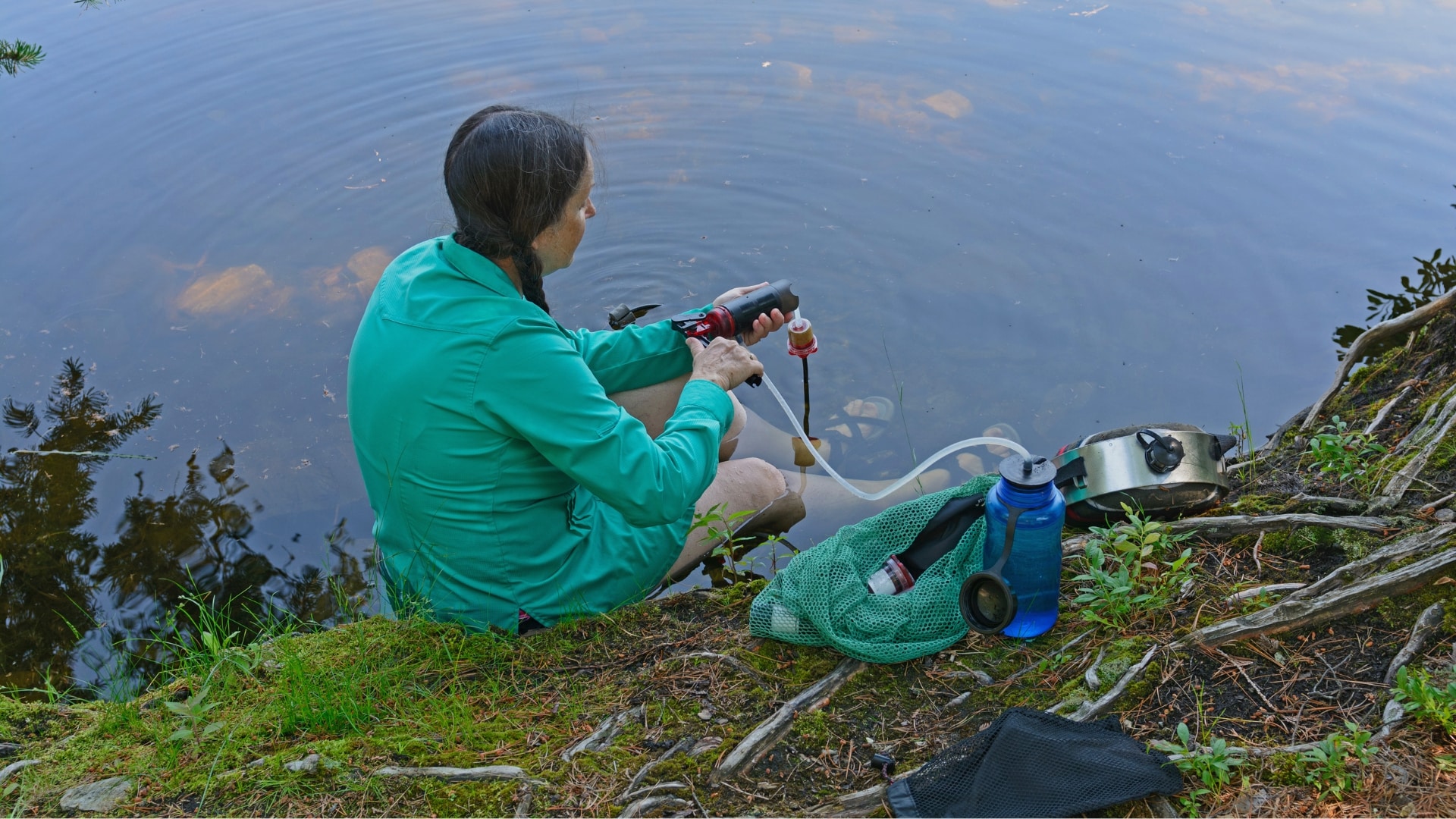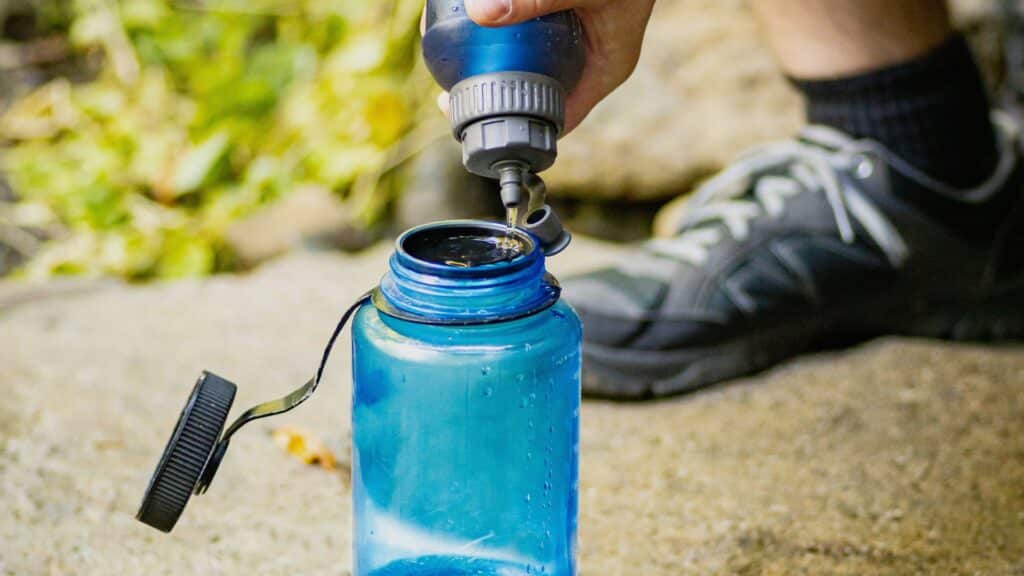
When you're exploring the wilderness, having a reliable water filter is essential. The Sawyer Products Squeeze Water Filtration System removes almost all bacteria and protozoa, making it a top pick. For a compact option, the Sawyer Mini offers similar performance. The Waterdrop Gravity Water Filter Straw, with a 5-stage filtration process, is perfect for emergencies. The Katadyn Hiker Pro, featuring a 0.2-micron glass fiber filter, is effective for those who prefer hand pumps. Each filter has its advantages, like portability or flow rate speed, ensuring you stay hydrated safely. Read on to discover which of these backpacking water filters suits your adventure.
When you're planning an adventure in the great outdoors or preparing for unexpected emergencies, the Waterdrop Gravity Water Filter Straw is an excellent choice for guaranteeing clean drinking water. This filter straw features a 5-stage filtration system, including coconut shell activated carbon and a 0.1 micron ultrafiltration membrane. It effectively reduces chlorine, sediment, and bad tastes from your water. You can filter up to 1,400 gallons at a rate of 700 ml per minute. It also comes with a 1.5-gallon gravity-fed water bag, which is handy for both camping and emergencies. For best results, connect it to water bags or bottles for easy use. Remember to test and clean it before using, and check all components are intact to guarantee proper filtration.
Best For: Outdoor enthusiasts and emergency preparedness planners who need a reliable water filtration solution for clean drinking water in various conditions.
Pros:
Cons:
The Sawyer Products Squeeze Water Filtration System (SP129) is perfect for outdoor enthusiasts seeking a reliable, lightweight filtration solution. Weighing just 2 ounces, it fits in your hand and includes two 32-ounce BPA-free pouches, a straw, and a hydration pack adapter. Its high-performance 0.1 micron filter removes 99.99999% of bacteria and 99.9999% of protozoa, ensuring safe drinking water. You can fill a pouch from any water source, attach the filter, and drink directly or squeeze water into a bottle. It's compatible with standard water bottles and gravity systems. Maintenance is simple with a syringe for backflushing. The filter is praised for its compact size and quick filtration, making it a top choice for hikers and campers.
Best For: Outdoor enthusiasts and adventurers looking for a lightweight, reliable water filtration system for activities like hiking, camping, and emergency preparedness.
Pros:
Cons:
Perfect for outdoor enthusiasts and adventure seekers, the Sawyer Products SP128 Mini Water Filtration System is your go-to option for ensuring safe drinking water during hikes, camping trips, or global travels. Weighing just 2 ounces, this compact filter uses a high-performance 0.1 micron absolute inline filter. It removes 99.99999% of bacteria and 99.9999% of protozoa, ensuring your water is safe to drink. You can attach it to a drinking pouch, a standard 28 mm disposable water bottle, or a hydration pack. Use the included straw for direct drinking. Each filter is tested by Sawyer three times for quality. It's rated to filter up to 100,000 gallons, making it ideal for both short outings and extended adventures.
Best For: Outdoor enthusiasts and adventure seekers looking for a reliable, compact water filtration system for safe drinking water during hikes, camping, or global travels.
Pros:
Cons:
Looking for a reliable backpacking water filter? The Waterdrop Gravity Water Filter Straw is just what you need for camping or emergency preparedness. This filter includes a 1.5-gallon gravity-fed water bag, making it easy to carry and use. It features a 5-stage filtration process with coconut shell activated carbon and a 0.1-micron ultrafiltration membrane. These materials help remove harmful substances like chlorine, sediment, and bad odors, ensuring clean water up to 1,400 gallons.
The gravity-fed design allows for easy filtration without electricity or pumping. It's lightweight, weighing about 16 lbs when full, and can connect to water bags or bottles. While it's perfect for small groups, larger groups might find the flow rate slow. Users praise its efficiency and excellent water quality.
Best For: Outdoor enthusiasts and individuals seeking a reliable water filtration solution for camping and emergency preparedness.
Pros:
Cons:
For outdoor enthusiasts seeking a reliable water filtration solution, the Katadyn Hiker Pro Hand Pump Water Filter stands out as a top choice. It's designed for camping, backpacking, and even emergency survival situations. This filter uses an AntiClogTM, 0.2-micron glass fiber filter to remove harmful bacteria and protozoa from water. It also includes an active carbon core to reduce bad tastes and odors. You'll find it easy to use, with a flow rate of 1 liter per minute. Weighing just 11 ounces, it's lightweight and portable, perfect for your outdoor adventures. The ergonomic handle makes pumping comfortable, while quick-connect hoses simplify setup. Although some users mention the cost of replacement filters, many praise its durability and effectiveness.
Best For: Outdoor enthusiasts, including campers, backpackers, and those preparing for emergency situations, who need a reliable and portable water filtration solution.
Pros:
Cons:

When choosing a backpacking water filter, consider several important factors to guarantee you select the best one for your needs. Look at the filtration efficiency levels to know how well the filter can remove bacteria and other harmful particles, and check the portability and weight to make certain it won't be too heavy for your journey. Additionally, evaluate the flow rate speed for how quickly it filters water, understand the maintenance requirements, and see if it offers versatility and compatibility with different water sources and containers.
A backpacker's choice of water filter hinges on its filtration efficiency, a vital factor ensuring safe hydration on the trail. When selecting a filter, you should look at its ability to remove harmful microorganisms. High-quality filters often claim to eliminate up to 99.99999% of bacteria and 99.9999% of protozoa. This level of efficiency is essential when you're drinking from sources like rivers or lakes.
To understand filtration efficiency, consider the filter's micron rating. A 0.1 micron absolute filter is effective at trapping bacteria and protozoa, providing you with safe drinking water. Also, different filtration technologies play a role. For instance, ultrafiltration membranes and glass fiber filters can enhance the removal of sediments and cysts, ensuring cleaner water.
Filter capacity is another important aspect. Some models can filter up to 100,000 gallons, which means you won't need to replace them frequently. However, remember that the filtration rate might change depending on the water quality and temperature. Clear water usually filters faster, while muddy or cold water might slow the process. Understanding these elements will help you choose the best filter for your backpacking adventures.
Packing light is vital when you're out on the trail, and that's where the portability and weight of a backpacking water filter come into play. Selecting a lightweight filter, typically between 2 to 11 ounces, can considerably ease your load during long hikes. It's important to verify the filter's design allows for compact storage. Many portable systems are small enough to fit in the palm of your hand or slip into a backpack pocket, making them convenient to carry.
When choosing a filter, look for versatility in usage. Options like straw filters or compact pump systems are excellent choices because they can adapt to different water sources without adding much weight. Additionally, prioritize models with durable construction. Durability guarantees that your filter can withstand rugged outdoor conditions while maintaining a lightweight profile, which is essential for ideal portability.
Remember to assess each filter's ability to fit into your gear setup. A well-chosen filter should offer a balance of light weight, compact design, and robust durability. This balance guarantees you stay hydrated on your adventures without feeling burdened by heavy or bulky equipment.
Selecting the right backpacking water filter involves more than just considering portability and weight. You also need to think about the flow rate speed, which is essential for efficient filtration. Some water filters can process up to 1 liter per minute. This is ideal if you need quick hydration during outdoor activities. Hand pump filters often meet this speed, letting you gather clean water from different sources with consistent pumping.
However, not all filters work at the same speed. Gravity-fed systems usually have slower flow rates. Filling a larger container might take several minutes. This can be inconvenient if you're with a larger group that needs water immediately. Additionally, some filters slow down in colder temperatures or when filtering murky water, affecting how fast they work.
Before heading out, it's a good idea to test your filtration system. Consider how fast it filters water and how that speed matches your group's size and the trip's duration. By doing this, you'll guarantee you have the right filter to meet your hydration needs in the wilderness, allowing you to stay focused on your adventure.
When choosing a backpacking water filter, maintenance requirements are vital for guaranteeing ideal performance and longevity. Regular maintenance helps your filter work at peak efficiency and last longer. Many filters come with tools like backflush syringes or cleaning plungers. These tools help you clean the filter by pushing water through it in the opposite direction, removing trapped debris and preventing clogging.
Filters with a backwash function are particularly convenient. They let you clean the filter without taking it apart, saving time and effort. This easy maintenance feature can greatly extend the filter's lifespan. Always inspect your filter for any wear and tear, such as cracks or missing parts, both before and after each use. This prevents contamination and guarantees the water you drink is safe.
Some filters have replaceable elements that you'll need to change regularly. How often you replace them depends on how frequently you use the filter or the amount of water you've filtered. Proper storage and cleaning are also important. After using the filter, especially when exposed to unfiltered water, clean and store it correctly to prevent bacterial growth and maintain its effectiveness.
Considering the maintenance of your backpacking water filter is essential, but its versatility and compatibility also play a significant role in your outdoor adventures. When choosing a filter, it's important to guarantee it can connect with various water sources like hydration packs, water bottles, or pouches. This flexibility lets you adapt to different situations, making hydration easier on the trail. Confirm the filter fits standard bottle threads, typically 28mm, so you can use it with commonly available containers.
Additionally, look for systems offering multiple filtration methods. Options like gravity-fed, squeeze, or pump systems allow you to choose what works best, depending on your surroundings and personal preference. For instance, a gravity system can provide hands-free operation, which is convenient when setting up camp.
Make sure the filter performs well across various water sources, whether you're dealing with clear streams or murky lakes. This guarantees you'll have safe and clean water regardless of conditions. Finally, consider if the filter can be easily carried during activities, allowing you to quickly access it whenever needed. By focusing on these factors, you'll find a water filter that makes your wilderness experience more enjoyable.
Durability and longevity are essential when you're choosing a backpacking water filter. You'll want a filter made from durable construction materials that can handle rugged outdoor conditions, including occasional drops or impacts. This means looking for models that have been tested extensively for reliability and performance. These tests often indicate how well a filter will hold up over time, ensuring it remains effective throughout your adventures.
Consider filters with a backwash function or other easy cleaning mechanisms. These features help maintain flow rates and performance, extending the filter's lifespan. When a filter is easy to clean, you can avoid clogs that might otherwise shorten its useful life. Also, check the filter's rated lifespan in gallons or liters. Filters that can process larger volumes before needing replacement usually offer better long-term value.
Additionally, research user feedback on maintenance requirements and the frequency of filter replacements. Products with lower ongoing costs and simpler upkeep are often more durable in the long run. By considering these factors, you'll find a backpacking water filter that not only lasts but also provides safe, clean hydration during your wilderness adventures.
When using backpacking water filters, you'll find they can enhance, alter, or maintain the taste of water. First, filters remove dirt and bacteria, making water taste cleaner. Second, some filters have carbon components that reduce chemical tastes and odors, improving flavor. Finally, be aware that mineral content may still affect taste, but it's usually less noticeable. Always make sure your filter's properly maintained, keeping your hydration safe and pleasant.
When you're filtering water in the wild, not all filters can remove viruses. Most backpacking water filters work well for bacteria and protozoa, but viruses are much smaller. To remove viruses, you should look for a purifier, not just a filter. Purifiers often combine filters with chemical treatments like iodine or UV light. Always check the product specifications, ensuring it mentions virus removal, to keep your drinking water safe.
How long can you rely on your backpacking water filter? Typically, a filter lasts between 500 and 1,500 liters. First, check the manufacturer's guidelines for specifics. Regular maintenance is key; clean it after each use to extend its life. Avoid freezing temperatures, as they can damage the filter. Over time, flow rates may decrease, signaling it's time for replacement. By monitoring usage and maintaining your filter, you guarantee safe water on your adventures.
When you're looking for eco-friendly water filter options for backpacking, consider filters made from sustainable materials. Choose those with biodegradable or recyclable components. Some brands offer filters with replaceable cartridges, minimizing waste. You can also look for filters that don't require batteries, reducing environmental impact. Always check product labels for eco-certifications. By picking eco-friendly options, you're helping protect the environment while ensuring your water is safe and clean.
To clean and maintain your backpacking water filter, first, rinse it with clean water. Then, backflush it by pushing clean water in the reverse direction to remove trapped particles. If the filter has removable parts, disassemble and scrub them with a brush. Dry all parts completely before storing in a dry place. Regularly check for wear or damage, and replace parts if necessary to guarantee safe and efficient filtering on your trips.
